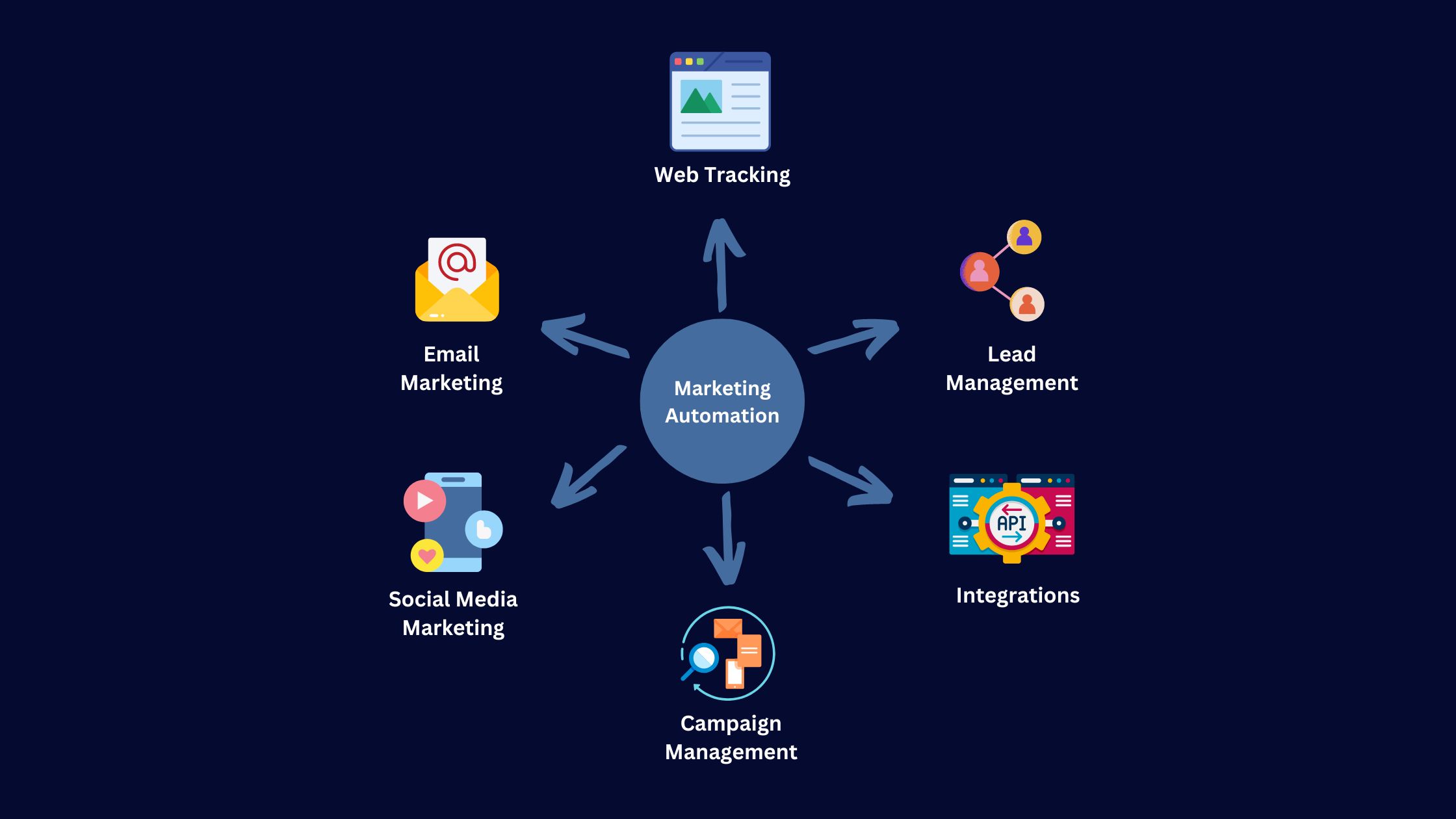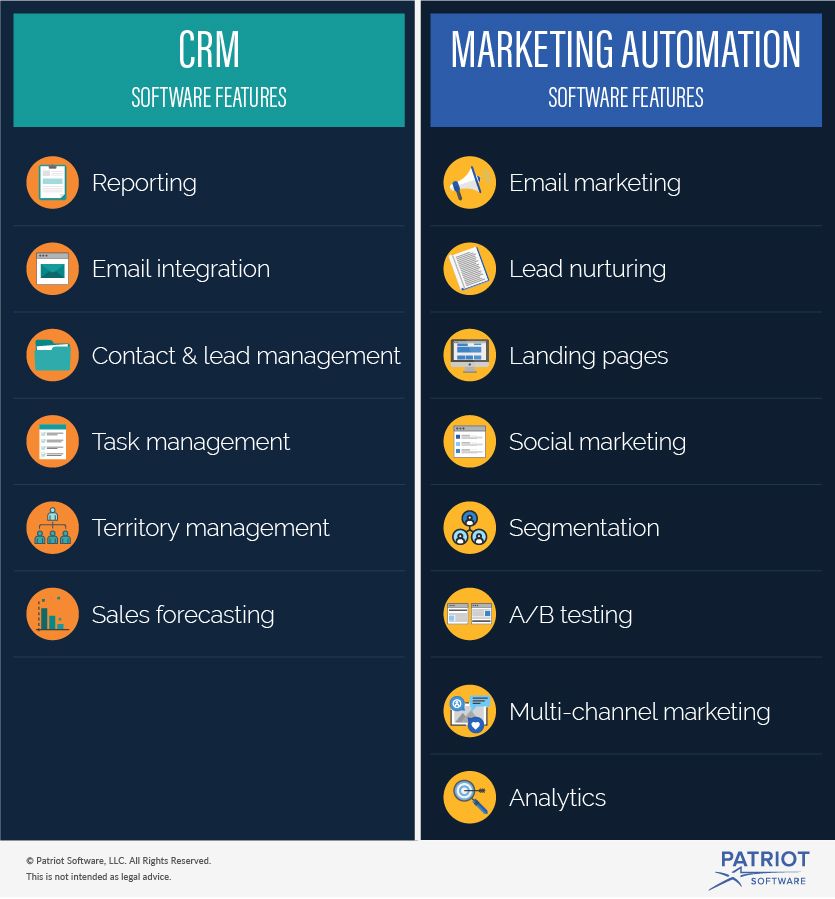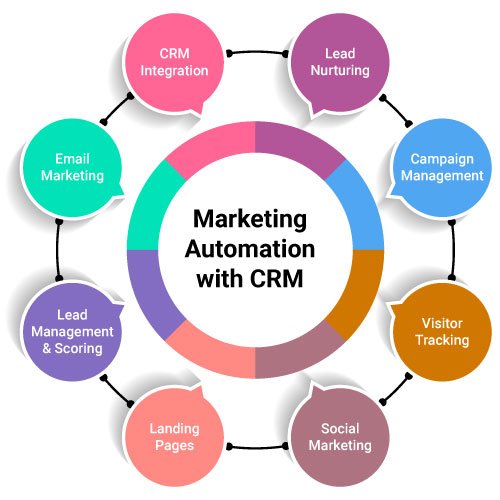Customer Relationship Management (CRM) and Marketing Automation Software are essential tools for businesses. They help improve customer interactions and streamline marketing efforts.
Understanding the difference between CRM and Marketing Automation Software is crucial. CRM focuses on managing customer relationships, tracking interactions, and maintaining customer data. It helps sales teams keep track of leads and customer history. On the other hand, Marketing Automation Software automates marketing tasks.
It manages campaigns, tracks engagement, and nurtures leads through automated workflows. Knowing how each tool works and their distinct purposes can help businesses make informed decisions. This comparison will clarify the unique functions and benefits of each, ensuring you choose the right tool for your needs.

Credit: encharge.io
Crm Overview
Customer Relationship Management (CRM) software helps businesses manage and analyze customer interactions. It improves customer relationships and drives sales growth. Let’s dive into the essentials of CRM.
Definition Of Crm
CRM is a technology for managing all your company’s relationships and interactions with customers. Its goal is to improve business relationships. A CRM system helps companies stay connected, streamline processes, and improve profitability.
Key Features Of Crm
A CRM system comes with several essential features:
- Contact Management: Stores customer information like names, addresses, and social media accounts.
- Interaction Tracking: Logs interactions with customers, including emails, calls, and meetings.
- Lead Management: Tracks leads and movements through the sales pipeline.
- Task Management: Assigns and tracks tasks related to customer interactions.
- Reporting and Analytics: Generates reports on sales activities and customer interactions to help make informed decisions.
- Email Integration: Syncs with your email system to manage communications directly from the CRM.
- Mobile Access: Allows access to CRM data from mobile devices, ensuring flexibility and remote work capabilities.
These features help businesses manage customer relationships more effectively, leading to better customer satisfaction and higher revenue.
Marketing Automation Overview
Marketing automation helps businesses manage marketing tasks more efficiently. It uses software to automate repetitive tasks. This includes email marketing, social media posting, and ad campaigns. This allows marketers to focus on strategy and creativity.
Definition Of Marketing Automation
Marketing automation refers to software platforms. These platforms automate marketing actions. It helps streamline lead generation, nurturing, and scoring. It enables personalized marketing at scale.
Key Features Of Marketing Automation
Email Campaigns: Automate email marketing to send timely messages. Segment lists and personalize content.
Lead Management: Track and manage leads throughout their journey. Score leads based on engagement.
Social Media Management: Schedule posts and monitor social interactions. Engage with your audience effectively.
Analytics and Reporting: Measure the success of campaigns. Use data to improve future efforts.
Customer Segmentation: Group customers based on behavior and demographics. Tailor marketing messages to specific segments.
Core Differences
Understanding the core differences between CRM and marketing automation software can help businesses choose the right tools. While both CRM and marketing automation aim to enhance customer experiences, they serve distinct purposes. Let’s dive into their core differences.
Focus Areas
CRM, or Customer Relationship Management, focuses on managing customer interactions. It tracks sales, customer service, and support. The goal is to improve business relationships. CRM helps in understanding customer needs and behaviors.
Marketing automation software, on the other hand, focuses on automating marketing tasks. It handles email campaigns, social media postings, and lead nurturing. The goal is to generate and qualify leads. Marketing automation software streamlines repetitive marketing activities.
Primary Users
Sales teams primarily use CRM software. They track customer interactions and manage sales pipelines. CRM helps sales teams stay organized and efficient. It provides valuable insights into customer preferences.
Marketing teams mainly use marketing automation software. They create, execute, and analyze marketing campaigns. This software helps marketing teams save time and improve productivity. It also provides data on campaign performance.

Credit: www.rolustech.com
Benefits Of Crm
Understanding the benefits of CRM can significantly enhance how a business manages its interactions with customers. CRM systems offer a variety of tools that help companies improve their relationships, streamline processes, and increase profitability. Let’s explore some key advantages.
Customer Relationship Management
CRM software stores all customer information in one place. This makes it easy to access and update customer details. It helps businesses provide better customer service and support. Teams can track customer interactions and preferences. This leads to more personalized service and increased customer satisfaction.
Sales Tracking And Analysis
CRM systems offer powerful tools for tracking sales activities. They help sales teams monitor leads and opportunities. Managers can analyze sales data to identify trends. This insight helps in making informed business decisions. Accurate tracking ensures that no potential sales are missed. It also helps in forecasting future sales performance.
Benefits Of Marketing Automation
Marketing automation offers numerous benefits that streamline processes and enhance efficiency. Businesses can save time, reduce costs, and improve targeting. Let’s dive into some key benefits of marketing automation.
Lead Nurturing
Marketing automation helps nurture leads through personalized communication. Automated emails and messages guide leads through the buying journey. This keeps potential customers engaged and informed.
Automated lead scoring identifies the most promising prospects. This ensures sales teams focus on the right leads. Consistent follow-ups build trust and increase conversion rates.
Campaign Management
Marketing automation simplifies campaign management. Businesses can plan, execute, and monitor campaigns from a single platform. This allows for consistent messaging across all channels.
Automation tools track the performance of each campaign. Real-time analytics provide insights into what works best. Adjustments can be made quickly to improve results.
Automated scheduling ensures timely delivery of content. This keeps your audience engaged at the right moments. Consistent communication enhances brand recognition and loyalty.
When To Use Crm
Understanding When to Use CRM can help enhance your business operations. Customer Relationship Management (CRM) software is essential for managing customer interactions. It provides tools to streamline various business processes. Below are key scenarios where CRM is invaluable.
Customer Support
CRM systems offer tools for managing customer support. They help track customer interactions across multiple channels. This ensures no query goes unanswered. CRMs also store historical data. This allows support agents to view past issues and resolve them quickly.
With CRM, you can create a centralized database. This database includes all customer information. It helps support teams deliver personalized experiences. Automated ticketing systems within CRM can assign issues to the right agents. This leads to faster problem resolution.
Sales Processes
CRM software is crucial for streamlining sales processes. It helps manage leads and prospects. Sales teams can track interactions and follow-ups. This ensures no lead falls through the cracks.
You can use CRM to automate repetitive tasks. Examples include sending follow-up emails or scheduling meetings. This allows sales teams to focus on closing deals. Additionally, CRM systems offer sales forecasting tools. These tools help predict future sales and plan strategies accordingly.
| Feature | Benefit |
|---|---|
| Customer Database | Centralized information for personalized support |
| Automated Ticketing | Faster issue resolution |
| Lead Management | Better tracking of prospects |
| Sales Forecasting | Predict future sales trends |
When To Use Marketing Automation
Marketing automation software can greatly enhance your marketing efforts. It helps in automating repetitive tasks and personalizing customer interactions. Knowing when to use marketing automation is key to achieving your marketing goals efficiently.
Lead Generation
Marketing automation is essential for lead generation. It helps capture and nurture leads effectively. Automated forms and landing pages collect valuable information from visitors. You can then score these leads based on their interactions. This ensures your sales team focuses on the most promising prospects.
Email Marketing
Email marketing becomes more efficient with automation. You can send personalized emails based on user behavior. Automated email workflows guide your leads through the sales funnel. This keeps your audience engaged and informed.
Automation also ensures timely follow-ups. Schedule emails to be sent at optimal times. This increases the chances of your emails being opened and read.
Integration Of Crm And Marketing Automation
CRM and marketing automation software serve different purposes. CRM focuses on managing customer relationships and sales. Marketing automation streamlines marketing tasks and campaigns. Integrating both enhances customer interaction and marketing efficiency.
Integrating CRM and marketing automation can transform how businesses operate. This integration streamlines workflows and enhances customer engagement. It combines the strengths of both systems, leading to more efficient business processes. By integrating these tools, you can improve data accuracy and create personalized customer experiences.Combined Benefits
Combining CRM and marketing automation software offers several benefits. It helps align sales and marketing teams. Both teams access the same customer data, leading to better collaboration. This integration also enhances lead nurturing. Marketing automation manages the initial stages of the customer journey. CRM handles the later stages, such as sales and customer support. Another benefit is improved customer segmentation. Marketing automation segments leads based on behavior and engagement. CRM uses this data to tailor sales pitches and support responses. This results in more relevant interactions with customers.Best Practices
To get the most out of this integration, follow some best practices. Start by ensuring data consistency across both systems. This avoids duplicate records and keeps information up-to-date. Next, define clear roles for sales and marketing teams. Clarify who handles which part of the customer journey. Regularly train your teams on using both systems. This keeps everyone updated on new features and best practices. Use analytics to measure the performance of your integrated system. This helps identify areas for improvement and optimize your strategies. Lastly, keep customer data secure. Use encryption and other security measures to protect sensitive information. This builds trust with your customers and ensures compliance with data protection regulations. “`
Credit: smallbusiness.patriotsoftware.com
Frequently Asked Questions
What Is Crm Software?
CRM software is a tool used to manage customer relationships. It helps businesses organize and access customer data efficiently.
What Is Marketing Automation Software?
Marketing automation software automates marketing tasks and workflows. It helps streamline marketing processes and improves campaign efficiency.
How Do Crm And Marketing Automation Differ?
CRM focuses on managing customer relationships. Marketing automation focuses on automating marketing activities. Both complement each other.
Can Crm And Marketing Automation Integrate?
Yes, CRM and marketing automation software can integrate. Integration helps streamline processes and improve data consistency.
Conclusion
Choosing between CRM and marketing automation software depends on your needs. CRM helps manage customer relationships effectively. Marketing automation streamlines marketing tasks for better efficiency. Both tools can boost business growth. Understanding their differences is crucial. This ensures you pick the right tool.
Make informed decisions for your business. Your goals will guide your choice. Each tool offers unique benefits. Evaluate your priorities carefully. Then select the best fit for your organization.




